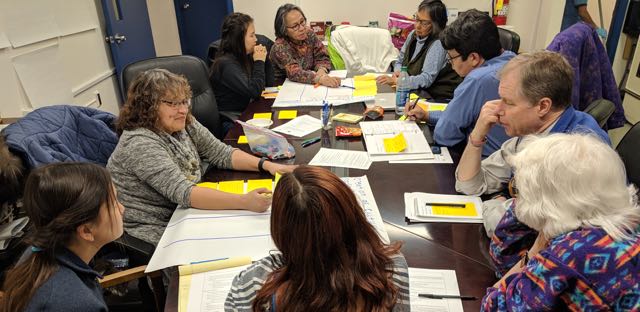Transforming School Policy

By Lori Grassgreen, Director of Alaska ICE
Many school districts across the state have been working to develop culturally responsive and trauma-informed schools to more effectively create optimal conditions for learning. Most districts, however, have not yet developed and adopted policies to support these practices within the district.
Through a partnership with the Robert Wood Johnson Foundation focused on Cultural Safety in Education, the Association of Alaska School Boards has been able to work with school board members and district staff from two school districts to review the more than 400 policy recommendations with a cultural safety and trauma-informed lens. It is through policy that boards govern their districts and set expectations for how the district delivers and implements education.

Southwest Region and Nome Public Schools Board Members Reviewing AASB Policy
Cultural safety and trauma-informed practices both build on the idea that when students feel safe, they are most able to be successful learners. Cultural safety identifies nine key areas to consider when creating a culturally safe environment including school district policies and accountability; hiring and training practices; curricula, content, and regional accurate histories; culturally safe and supportive school environment and facilities; community conversations- healing dialogues; community input and decision making; culturally specific activities and experiences (including language); and instructional practices and equitable outcomes.
Out of the 400 policy recommendations AASB offers school districts, over 40 policies were chosen for review. School board members, or AASB staff, then took a deeper look at thirty-six policies. We discussed some key questions.
- What changes could be suggested to be transformational for cultural safety in education?
- What would need to be included or removed for this to happen?
- What is it we want the policy to accomplish?
- Does changing the policy have any federal or state directive?

Nome Cultural Committee (NPS staff, school board members, students, and community partners) Conducting Cultural Safety in Education District-wide Scan
AASB and district staff reviewed policy recommendations offered in other states and reviewed policies of districts that have shown a deep commitment to incorporating trauma-informed and culturally responsive practices.
A proposed draft was sent to legal counsel to review and ensure compliance with state and federal laws.
Examples of policy recommendations:
Food and Nutrition: Alaska subsistence foods can be incorporated into the schools while still being compliant with federal nutrition and safety laws (food and nutrition).
The key philosophies section was re-drafted to incorporate equity and healing within schools and community as a foundation of the district.
Other areas such as community relations did not previously have any recommendation only a chapter heading. Nome Public Schools and Southwest Regions School Board Members worked to develop model policies that encourage school and community partnerships.
There are now policy recommendations for discipline that incorporate restorative practices within the discipline policy. This shifts policies from a zero tolerance model to a model that first ensures the safety of all students and then ensures corrective and supportive actions that will quickly reintegrate students into the classroom.
Below is a full list of new policy recommendations that will be available through policy online in early 2019.
Many school boards review a certain number of policies each year. Consider reviewing some of these policies this year:
- 0100 Philosophy
- 0410 Non-discrimination
- 0420 School-Based Management
- 1000 Community Relations
- 1260 Visits to the Schools
- 1311 Participation in Community Life
- 1312 Public Complaints Concerning the School
- 1312.1 Public Complaints Personnel
- 1312.2 Public Complaints of Instructional Materials
- 1330 Use of School Facilities
- 1212.3 Complaints of Discrimination
- 100 Relations Between Other Governmental Agencies and the Schools
- 3543 Transportation, Emergency and Safety
- 3550 Food Service
- 3541 School Related Trip
- 4000 Concepts and Roles
- 5124 Communication with Parents
- 5030 School Discipline and Safety
- 5040 Nutrition and Activity
- 5131 Student Conduct
- 5132 Dress and Grooming
- 5137 Positive School Climate
- 5147 Dropout Prevention
- 6115 Ceremonies and Observances
- 6141-3 Multicultural Education
- 6142.3 Science Instruction
- 6142.4 Community Service
- 6142.5 Environmental Education
- 6143 Courses of Study
- 6144 Controversial Issues
- 6161.1 Selection and Evaluation of Instructional Materials
- 6146.1 High School Graduation Requirements
- 6174 Bilingual / Bicultural Education
- 7100 Planning
- 8000 Concepts and Roles
# # #
